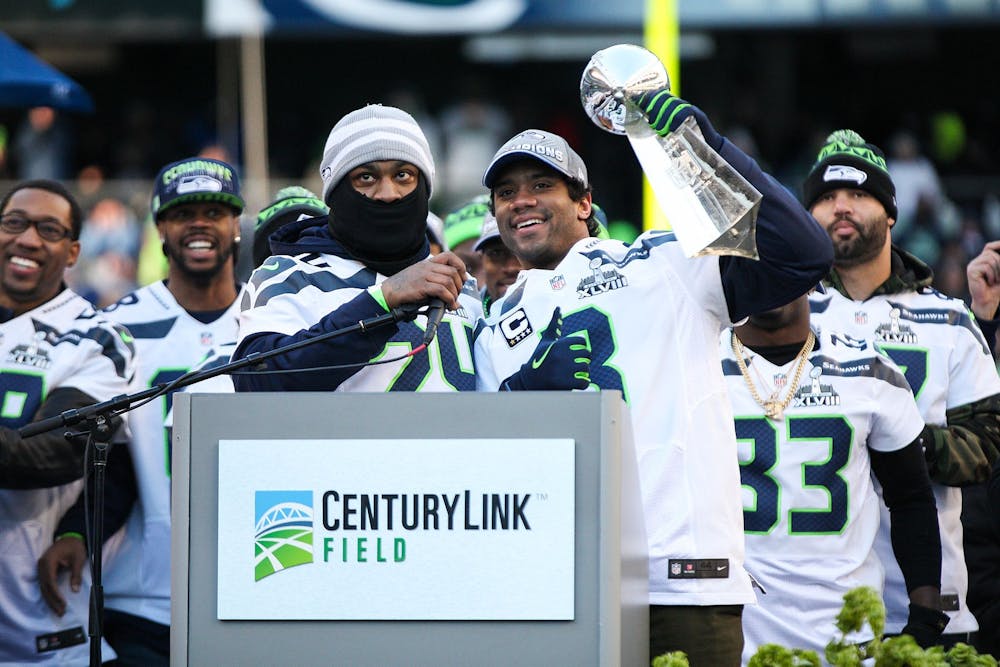A recent op-ed by guest contributors in The Daily Princetonian objecting to the selection of Marshawn Lynch as this year’s Class Day speaker has garnered widespread attention across campus and in the national media. Aside from being misconstrued as being representative of the campus community, the dismissive attitude towards Lynch within the article falls in line with a long history of disrespect towards black athletes.
In America, we have a tendency to see athletes in purely one dimension: their contribution to their sport. We applaud them for scoring touchdowns and winning titles, but as soon as they open their mouths, we turn on them.
It is this tendency that led to Colin Kaepernick’s being blackballed from the NFL, and to Laura Ingraham’s telling LeBron James, who is apparently “paid $100 million a year to bounce a ball,” to “shut up and dribble.” The idea that athletes have nothing productive to add to our national conversation and that their intelligence begins and ends with their ability to run routes and read defenses shapes the way many people think about even our most dominant sports figures.
This especially affects black athletes, who are given even less freedom to speak their minds given longstanding stereotypes. Even on the field, black athletes are often described as having good instincts or having superhuman physical abilities, while their white counterparts are lauded for their intellectual acuity.
This attitude also evidences itself in the rhetoric people use to talk about athletes when they speak beyond the context of sports. People often assume that once a black player earns a certain amount of wealth, they lose their authority to speak on issues of inequality. LeBron’s millions of dollars did not, however, protect him from having the n-word scrawled across his house. Nor did Serena Williams’s achievements in tennis prevent doctors from doubting her when she told them about complications after giving birth to her daughter.
It comes as no surprise, then, that there was a negative reaction by some when Marshawn Lynch was announced as this year’s Class Day speaker. Some students thought, “Marshawn Lynch? The football player famous for his unwillingness to speak to the media?” and wrote off the choice as misguided.
The writers say that they “do not mean to criticize this choice of speaker in particular, but rather to call attention to the opaque selection process for Class Day speakers.” Yet the bulk of their article focuses specifically on Lynch and their belief that he does not qualify to be a Class Day speaker. In the next paragraph, for example, they point out that Lynch doesn’t fit the past pattern of speakers “widely regarded as exceptional communicators.”
But it is sorely misguided to claim that because Lynch refused to play the sports media game — which usually just consists of athletes giving variations of the same canned answers — he has nothing to say at all. The writers may not come out and say it, but underlying their dismissive tone is the same sentiment that motivates other disregard for athletes. Moreover, their homing in on Lynch’s communication skills echoes a common racist stereotype of black people as inarticulate.

Lynch has done a lot outside of football to advocate for change. The Class Day committee emphasized in its announcement that they did not choose Lynch just because of his skill on the field, but also because of his social activism. One of Princeton’s key values is service and community engagement, and Lynch embodies those ideals through his philanthropic work. As a first-generation college student himself, having attended the University of California Berkeley, Lynch can share experiences that many FLI students here can relate to.
We need to stop treating athletes as puppets or performers acting for our consumption. They are people, and they have interests and ideas outside of their sport.
The idea that a speaker has to have attended Princeton, or be related somehow to our campus, leaves out a huge swath of people who not only have ideas to share, but also bring a perspective outside the bounds of the Orange Bubble that can actually be more impactful. Lynch doesn’t have to have gone to Princeton to understand our values.
It should also be noted that film director Christopher Nolan gave the Class Day speech in 2015. He had no prior connection to Princeton, besides the fact that Batman dropped out of the school. It is in fact not the norm for an alum to give the Class Day address, as a list of past speakers shows. Each speaker brings a fresh perspective as seniors prepare to enter the world beyond FitzRandolph Gate.

Princeton has a reputation, worsened by the media coverage of this latest op-ed, for being elitist and exclusive. Perhaps we should do less wondering why the Class Day speaker has no connection to Princeton and more soul-searching about why many alumni of color, most notably Michelle Obama, have distanced themselves from our school. If we want to shed our image as an elitist institution and reflect our evolving values and diversifying campus community, we have to welcome ideas that don’t fit the “Princeton mold.”
Rather than writing Lynch off as a niche and unworthy selection by an unrepresentative minority of students, we should open our minds and embrace the opportunity to hear from someone outside the Princeton bubble. I believe I stand with many of my peers when I say I could not be more excited to hear what Marshawn Lynch has to say, and I am proud to put my name behind that.
Julia Chaffers is a sophomore from Wellesley, Mass. She can be reached at chaffers@princeton.edu.








